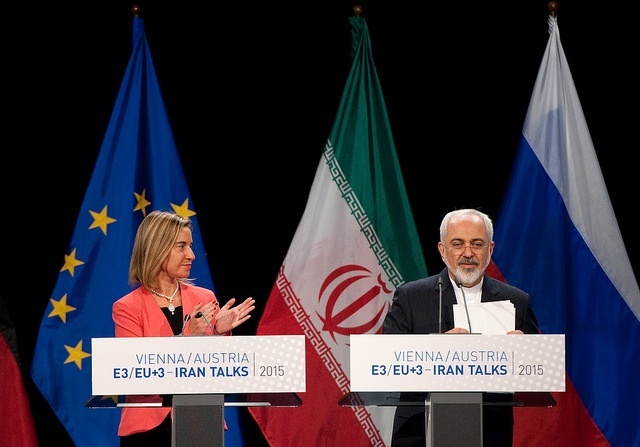Iran and the E3+3 will be returning to the negotiating table on April 8th to begin yet another round of high level talks on the status and future of the Iranian nuclear program. As ever, there are various causes for caution, and perhaps even concern, as the Iranians and their American and European counterparts continue to disagree on central issues such as the fate of the Arak heavy water reactor and permitted levels of nuclear enrichment. Despite these disagreements, however, there is also a compelling reason for optimism: the most consequential actors, Iran and the United States, seem genuinely committed to producing a deal, and have invested considerable political capital in the search for one.
There are, of course, the conventional explanations for why a comprehensive agreement would be desirable for both of these countries. The United States undoubtedly aims to secure itself and its allies from the ostensible perils posed by a nuclear-armed Iran (or one that is very close to having an arsenal), while the Iranian people seek a sense of globally-acknowledged legitimacy for their right to enrich and liberation from suffocating sanctions which have wreaked havoc on their economy. Yet, beyond these rather obvious motivations lies the significant issue of the personal political interests attached to these negotiations. For Presidents Obama and Rouhani, the nuclear talks have come to entail significance that extends beyond the aforementioned goals. More specifically, the success or failure of nuclear negotiations will have critical ramifications for their political positions and legacies domestically, adding an additional and highly personal impetus for ensuring the success of nuclear negotiations.
The political stakes are particularly high for Rouhani, whose domestic legitimacy and mandate to govern are inextricably linked to a fulfillment of his election promise to secure the removal of sanctions and return Iran to prosperity through ‘constructive engagement’ with the international community. Thus, Rouhani’s predicament is especially precarious as his effectiveness in producing tangible results through diplomacy will impact his standing with the Iranian electorate at large and his ability to mitigate challenges from Iran’s hardliners, who are becoming increasingly vocal in their opposition to the Iranian President’s diplomatic and domestic agendas. The country’s hardliners have already initiated attempts to impeach one of Rouhani’s ministers and have staged rallies criticizing his engagement with the West. However, progress in the talks has thus far kept the hostile hardliners at bay, with Khamenei urging tolerance for the diplomatic process and continuing to lend his tacit-albeit highly hesitant and skeptical- support to the nuclear negotiations. Should they fail to produce the desired results, however, the Supreme Leader will almost certainly withdraw his tentative backing for diplomatic overtures in favour of the more uncompromising approach promoted by hardline factions. Rouhani surely understands that a failure on the nuclear issue would inflict great damage on his domestic credibility, thereby compromising his control of the foreign policy agenda and his ability to pursue meaningful domestic change. Needless to say, this is a political price he cannot afford to pay so early on in his presidential tenure.
Obama’s credibility is also at stake, although in a somewhat different way. The Iranian nuclear issue does not appear to be of fundamental importance to the American public but it is certainly a salient issue amongst the political class on Capitol Hill. Criticized for ‘leading from behind’, failing to establish a clear and decisive position vis-à-vis the crisis in Syria, and facing great challenges in addressing the seemingly unrelenting Israel-Palestinian confrontation, the President likely views the Iranian nuclear negotiations as an important opportunity for the redemption of a somewhat fractured and inconsistent Middle East policy. After all, much like his Iranian counterpart, Obama’s diplomatic engagement with Iran has faced stiff opposition at home from politicians who have fought to impose additional sanctions on Iran and have expressed disapproval of Obama’s allegedly permissive approach to negotiations in a number of strongly-worded letters to the President. Success in nuclear talks will serve to neutralise such critics, at least to some degree, and will provide the President with a notable and much-needed foreign policy victory. A failure, on the other hand, will simply be characterized as yet another foreign policy blunder by the Administration and will likely serve as an additional instrument which the President’s impassioned critics can brandish to further erode his authority. All in all, the Obama Administration has already invested a great deal in the talks and does not intend to walk away empty handed.
There are undeniably many obstacles and uncertainties on the road ahead for Iran and the E3 + 3 before they can reach any comprehensive agreement. Disparities between the positions of negotiating parties on important issues, regional and domestic sources of opposition, and upheavals in international affairs- not least the situation in Crimea- certainly do pose difficulties for the negotiations. Yet the value of political will and the attachment to success, particularly on the parts of the United States and Iran, should not be overlooked. Disagreements will surely continue to arise but the apparent commitment to producing a solution to this long-running issue presents a hope for overcoming outstanding sources of contention to secure a comprehensive agreement between Iran and its international partners. We have not seen such positive prospects for resolution in this long-running dispute for around a decade.

